An A-Z Guide to printing a music magazine
You should print a magazine
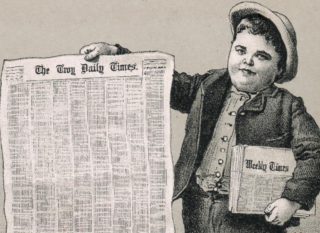
You should print a magazine
It’s not false modesty to say that if I can start printing a music magazine in 2005 and still be printing it in 2015, you most probably could, too. My biggest asset back then was my naivety as a university leaver, followed by the relative comfort and discomfort of having moved back home to Southend-on-Sea, and the boredom caused by my situation. I started printing Loud And Quiet in what had been my older brother’s bedroom, and have refused to stop since.
Ten years suddenly feels like a long time, and certainly time enough to work out the dos and don’ts of self-to-independent publishing, at least to an extent where you’re still enjoying yourself.
We’ll take a bunch of stuff as read, shall we? ‘Believe in yourself’; ‘Do it for the right reasons’; ‘Make something that is, first and foremost, for you’. It’s all true, but you already know that, and so I’ve omitted these and other such phrases of psycho-babble from my A-Z to publishing a music magazine. And please, anything you do find of use here, please do apply it to zines and publications on an infinite number of subjects beyond music, also. I mean, for god’s sake, just make something that speaks to you.
Let’s get this out of the way. There aren’t many things that are less ‘indie’ than money, but with all the good will in the world, you’re not going to be able to print a magazine for long without at least a little of it coming in. Our policy at Loud And Quiet has always been to never trade editorial space for advertising deals, which has meant, in the past, turning away money that could have been put to very good use. How you do it is your call, but when the time comes that someone finally returns a call to say, ‘yes, I do want to put an advertisement in Loud And Clear, please’, whatever you do, don’t pluck a figure out of your arse when you’re asked how much it will cost. Chances are you’ll feel too embarrassed to quote any figure above a pittance, and believe me, once you’ve charged someone £50 for a full page, you’ll never get them to pay more. So what you’ve doubled your print run – that figure will be burnt into their brain FOREVER! And they’ll tell their friends.
Presumably you’re doing this because you like bands and music so much, and the good news is that, overwhelmingly so, bands are a good lot, who appreciate that you are a fan more than anything else, which is why you’re at the venue four hours early to ask them how it feels to have an admirer in Alex Kapranos. Still, you can never tell them you love their record now and have them believe it. You are an evil, snooping journalist and no one likes you.

Crunchy guitars; squelchy synths; ethereal vocals. Clichés are a plenty in the world of music journalism, and y’know what, sometimes synths do sound squelchy. Maybe try to find a different word for it, though, as it’s the equivalent of a tabloid describing Rowan Atkinson as “Rubber-faced funny man Rowan Atkinson.”
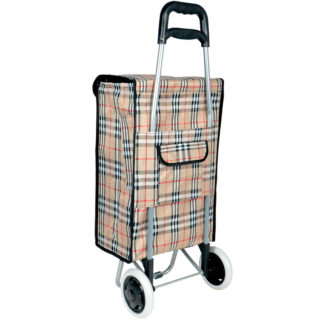 D is for Distribution
D is for Distribution
I’m a 32-year-old with a paper round, but while that was borne out of necessity (I had no money, and even if I had there wasn’t and still isn’t a company that distributes to all the stockists we like to be in), distributing as much as you can by yourself has its benefits. I won’t pretend it’s any fun, but at least you can keep an eye on what issues go down well and where they’re picked up, and you can constantly tailor how many you drop off in any one shop or venue. As the job gets bigger, upgrade your sports bag to a tartan shopper, and your shopper to a car or van. Eventually build up a team of trusted hands for places further afield (we now have help from record distributors Forte, and friends in Manchester, Sheffield and Leeds), but always do as much as you can yourself.
There are worse things than missing out on an interview with Grimes, like running an interview with We Smoke Fags.
A very practical one, this, but I’d highly recommend thinking very hard about the size of your new zine. There’s the simple, often overlooked fact that bigger pages call for more words (personally, I found that a side of A5 was plenty for my thrilling prose entitled We Salute Carl Barat in 2005), but a smaller format will also more easily find a home in stockists low on countertop space. It’s also much easier to drop them out the bottom of your trouser leg in those stores that haven’t given you permission to stock them in, yet.
you wouldnt belief the amount of writing we have been sent that with almost no grammar. Or terrible grammar.
The music industry is a very predictable one, and it loves strategic dates more than anything. “Release a record in the summer? Are you kidding!? It’s Glastonbury! Put out something in December? With all those ‘Now That’s What I Call Christmas’ records? C’mon!” After seven years of pulling teeth to put together copies of the magazine over these stringently fallow periods, we now don’t bother with January and August issues, and feel much better for it. Trust me, you would enjoy reading them even less than we would making them.
If The Emperor’s New Clothes is on one side of the tightrope, being impulsive is on the other. It’s a key part of popular music, and if everyone spent too much time analysing if something really is any good, and really isn’t going to be something you might be embarrassed by a little further down the line, nothing would get done and we’d all be writing exclusively about PJ Harvey and The Walkmen. If Sleigh Bells turn up and give you a genuine thrill, however fleeting it may or may not transpire to be, tell the world about it and say you were really high if anyone asks.
All successful publications have more than their fair share of humour. Take The Daily Mail… please.
Delusions of grandeur are a huge asset when you first start dropping your zine into local shops and onto beery pub tabletops. Harness that for at least the next 10 years. How else will you justify your mounting credit card debt over your first 3 years and your paper round at 32, as you regularly print issues, because all of this work couldn’t have been for nothing. If an airline fleet is grounded for more than a week it goes bust; if you put out an issue once every 8 months, you’ll stay bust.
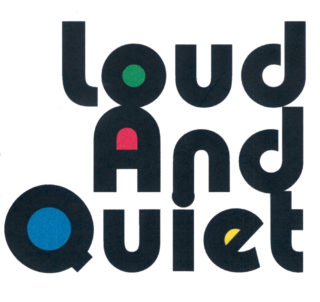
How does your magazine’s logo look? And how about shrunk down to 50 pixels wide so it can fit on the bottom of a flyer for a ‘festival’ in a Shoeburyness car park? And massive, for your stage at the festival? If things go as well as you hope, you too could wrestle with such logistical nightmares.
Money again, and just a note that printing a music magazine and giving it away for free is not a very good way of making any. On the contrary, it costs a hell of a lot in the beginning, which is where your delusions of grandeur – not to mention your love for these bands that now hate you – will come in handy.
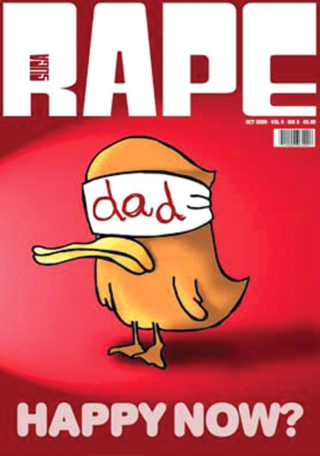 N is for Name
N is for NameYour magazine will become your life sooner than you think. You’ll tell your friends about it, be introduced to their friends via it; you’ll write down what it’s called a million times and say it aloud a million times more. All of this is made a lot more enjoyable if you don’t hate the name of your child. (And if the .com domain is free, even better). Personally, I’m not sure if I’ve ever loved ‘Loud And Quiet’, although it’s safe to say that those three words in that order don’t really mean anything to me anymore, like how I imagine Noel Gallagher feels about the terrible word Oasis. I never disliked it though, and if you find that you’ve made a mistake on that front, change it quick, or forever be mumbling out of the side of your mouth whenever someone asks you what you do. I am sorry to report that the names Vice and Dazed are both already being used by other people.
It can be (and probably will be) a cleaning cupboard on the unfavourable side of town, but after you’ve completed Q on this list, get yourself a cheap workspace where pants and a T-shirt are not considered suitable attire. This isn’t just for the good of your self-esteem, but also to help curb your borderline unhealthy obsession with your magazine that you’ve now said aloud around a billion times. Working from home for too long actually means the opposite of doing fuck all and watching Deal Or No Deal all day. You’ll probably have a lie in until 9, check your emails in bed, blink to find it’s 2pm, shower, eat, work until 8, eat again, call it a day, remember there’s something that you really should be doing, work again until 2am, which is why you’re going to lie in until 9 tomorrow. Take everything to a cupboard on the other side of town, where you can leave it until tomorrow.
Alex Young, Tony Soy, Caz McBain, Danny Canter, Niall Trent, Sam Little, Jane Doll. They wrote the very first issue of Loud And Quiet, and none of them exist. Not even Jenny Pencil. Disregarding just how awful the thing was, I figured that nobody was going to take seriously a music magazine (I had the audacity to insist it wasn’t a fanzine) that was written by one person, which is something I stand by. Until you’ve found some contributors (I started by emailing the faculties of University Journalism Degrees and asked them to forward on my plea to their students) just make up some names. A majority of the music industry is smoke and mirrors, so you’re in good company. And while you’re at it, erase ‘I’ from your vocabulary where your mag is concerned. It’s ‘we’. You, Alex, Tony, Caz and the others.
Obviously, don’t be too hasty on this one – it’s your job that’s kept you in print all this time. There’ll come a time, though (it was two years, for me), when you’ll be too knackered keep your hobby up, but not yet disillusioned enough to admit defeat and throw in the towel. Chances are you’ve not been enjoying your job anyway (because it’s not your hobby, and you’ve been operating on 4 hours sleep for 2 years), and so, when one or the other has to go, make it the job. A simplistic, hippyish view, perhaps, but if it doesn’t work out you can always get another job, whereas if you don’t give the mag a fair shot, what the fuck have you been doing these last two years?
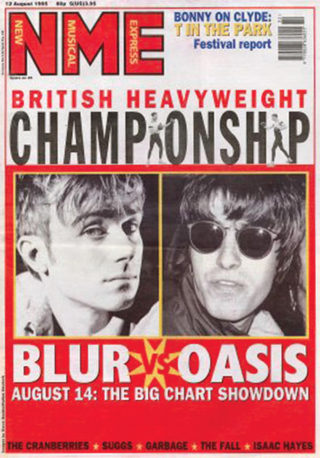 R is for Rivals
R is for RivalsI’d say this is my golden rule – do not entertain the idea of rivals. I won’t be so disingenuous to say that it’s not disappointing when you notice that another magazine or website features a band or artist you wanted to, or when they do a better job of something than you, or when they simply get there first. But constantly looking at what everyone else is doing is the quickest way to prevent yourself from doing whatever the hell you like, and that’s why you quit your job just now. I’ll check out Pitchfork once in a while, and I enjoy some of the features on The Quietus, but I don’t read any other music sites or magazines, for fear of it influencing what we’re doing (or not doing) in Loud And Quiet.
Simon Cowell has 11.4 million followers on Twitter, and he’s not once tweeted about music. Just think what you could achieve!
You’re definitely going to need a hand if you want to do this for any substantial amount of time. Form a small team of willing contributors and then, more importantly, show them some respect. You definitely won’t be able to pay them to start with – perhaps ever, is the sorry, true fact of it – so the least you can do is honour their work. We give our photographers carte blanche and insist that reviewers’ scores run as they are received. It can mean that records I love get a rougher ride than I was hoping they would, and that albums I can’t stand get a big thumbs up, from time to time, but if you’ve entrusted a review to a member of your team, and they’ve bothered to write down their opinions for your free music paper, the very least you can do is respect their judgment.
Okay, so ‘unique’ is pretty much unattainable in the world you’ve chosen to inhabit, but you can at least attempt to feature artists and articles that aren’t currently all over the place. The sole interview with Wild Beasts’ bassist is better than the seventh with FKA Twigs… You know what I mean.
Now that you’re molding the minds of fellow music fans, you’ll occasionally be granted access to the V.I.P. bar after gigs and at any number of music festivals. It’s a pretty special place – like the non-V.I.P. bar, only twice as busy and where tradition dictates that all conversations happen as the two participants look over one another’s left shoulder to see if that actually is Huw Stephens. It is. You’ve made it!

I know you’re a physical magazine, which yes, in itself, in 2015, tells me everything I need to know about what you think of the digital world. But I’m sorry, you do need a website, too – a half decent one. If nothing else, you can archive all of your past issues there, and tell people where they can go to pick up your real life publication, and when the next one is out. From my experience, you might even start to enjoy having a complimentary digital presence, as long as you continue to embrace the limits and craft of ink and paper above anything else. How else will new friends you make at parties be able to ask you what you think the role of traditional print media is in our modern digital world?
It’s nice to have a brag or two up your sleeve after all these years, and mine is that The xx performed at our very first club night to around 20 of us. Surely it’s no coincidence that they went on to sell hundreds of thousands of records after this event?
You might want to try all of this with a friend, and god knows that there’s been times when it would have been nice for me to turn to a partner and say, ‘can you believe it, that our shitty little fanzine has now become this, and here we are so close to Huw Stephens?!’, but that would have undoubtedly meant compromise and lingering on every little decision. Whether you do go it alone or buddy up, you owe it to your mag to be a bit of a Nazi. You could easily be made to think that a photo series on the life of Ian Beale is not such a hot idea if you ask for a second opinion.
I knew there must have been a reason for putting ‘zero pounds’ on the cover of every edition of Loud And Quiet, and not ‘free’ (F was for Format, remember?). After all your hard work, you’re now going to have to give it all away for nothing. It’s a cruel reality at first, made a little easier today by the fact that we now live in a world where paying for anything offends some people beyond belief. But never mind all of that. Get it out there and see what happens.